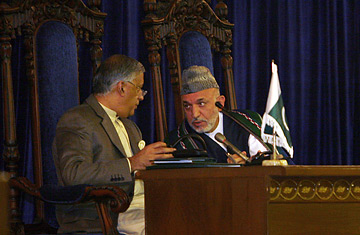
Afghan President Hamid Karzai speaks with Pakistani Prime Minister Shaukat Aziz, August 9, 2007 in Kabul.
The Bush Administration had high hopes for the peace conference that ended Sunday in Kabul — President Bush had dined last September with the battling Presidents Hamid Karzai of Afghanistan and General Pervez Musharraf of Pakistan, and hammered out plans for the summit of government and tribal leaders aimed at eliminating terrorism in the region. The fact that Musharraf and Karzai had refused to shake hands after their White House dinner may have been an ominous sign, but Washington remained optimistic. Just days ahead of the Peace Jirga, or assembly, Bush met with Karzai at Camp David and reiterated his hope that the jirga would help "end terrorism as a major factor fueling insecurity in the region," urging leaders in Pakistan and Afghanistan "to recognize that history has called us into action."
History may be disappointed. The jirga, a centuries-old regional tribal mechanism for resolving disputes, concluded Sunday with earnest speeches but little tangible result, attended by leaders with little power and regarded skeptically by civilians from both sides of the border.
Karzai dutifully opened the conference with an impassioned plea to "eliminate in one day [terrorist] oppression against both nations," but his co-chair Musharraf remained at home, in what appeared to be a deliberate snub of both the Afghan President and the U.S., which had initiated the event. The general eventually showed up three days late, to close the conference, after intense arm-twisting from both Karzai and U.S. Secretary of State Condoleezza Rice.
An even more notable absence among the 650 turbaned and bearded tribal elders from both sides of the border was that of the Taliban, and of the consortium of Pakistani religious parties and leaders who have the most influence over radical militants in the lawless areas of Pakistan's North West Frontier. These, after all, are the groups at the root of both countries' problems, and without their participation — or even that of any groups that have influence over them — the effect of the jirga will be little more than cosmetic.
The jirga aimed to provide an opportunity for tribal elders to formulate a strategy to combat the region's escalating terrorism threat, but it has little political legitimacy, and no capabilities for enforcement, laments political analyst and radio talk show host Dad Noorani. "This jirga was just a show, and will have a symbolic effect only," he says. "There is no guarantee that the achievements and recommendations made in this jirga will reduce the tensions in the region. It's the equivalent of throwing cold water on coals."
Even Musharraf's belated appearance offered little weight to the proceedings. The embattled President, whose popularity is rapidly declining, can barely tackle extremism in his own country. Since his crackdown on a radical mosque in his capital last month, terrorist attacks have escalated throughout the country. Some 200 members of the Pakistani armed forces have been killed by radical militants in the tribal areas bordering Afghanistan over the past two months. Musharraf's failed attempt to dismiss a popular Supreme Court justice, and subsequent Supreme Court rulings that threaten to stop him making another bid for the presidency this fall, have created a crisis of power in the country. The General, who took power in a bloodless coup in 1999, is at his weakest ever.
On the first day of the jirga, when Musharraf was supposed to be addressing the assembly with Karzai, he was instead holding emergency discussions with top military and political aides, debating whether or not to declare a state of emergency to shore up his waning political authority. A late-night call from Secretary Rice may have dissuaded him — although this is denied by Minister of Information Muhammad Ali Durrani, who says that the President had already decided against emergency rule "hours before" Rice's call.
Karzai, for his part, remains popular even though he lacks the power to lend any weight to decisions taken by the jirga. The Afghan leader is beholden to his Western backers for everything from funding to military might, and is helpless in the face of the mounting toll of civilian casualties inflicted by U.S. and coalition forces that are driving many Afghans back into the arms of the Taliban. This year's opium harvest was the largest ever; next year's looks to be even larger; and the Taliban, once declared defunct, embarked on two audacious frontal assaults on U.S. bases this week.
If, as President Bush declared nearly a year ago, the jirga held this week is the best hope for peace and reconciliation in the region, then such hopes are dimming. Aftab Ahmad Khan Sherpao, Pakistan's Interior Minister and head of the Pakistan delegation, declared at the conference's conclusion that, "Sitting here as brothers was the most significant achievement of this jirga." Indeed, public commitments to cooperation between the two countries is certainly a start. But how deep that commitment runs, and whether the two sides are able to enforce their decisions, remains to be seen.
